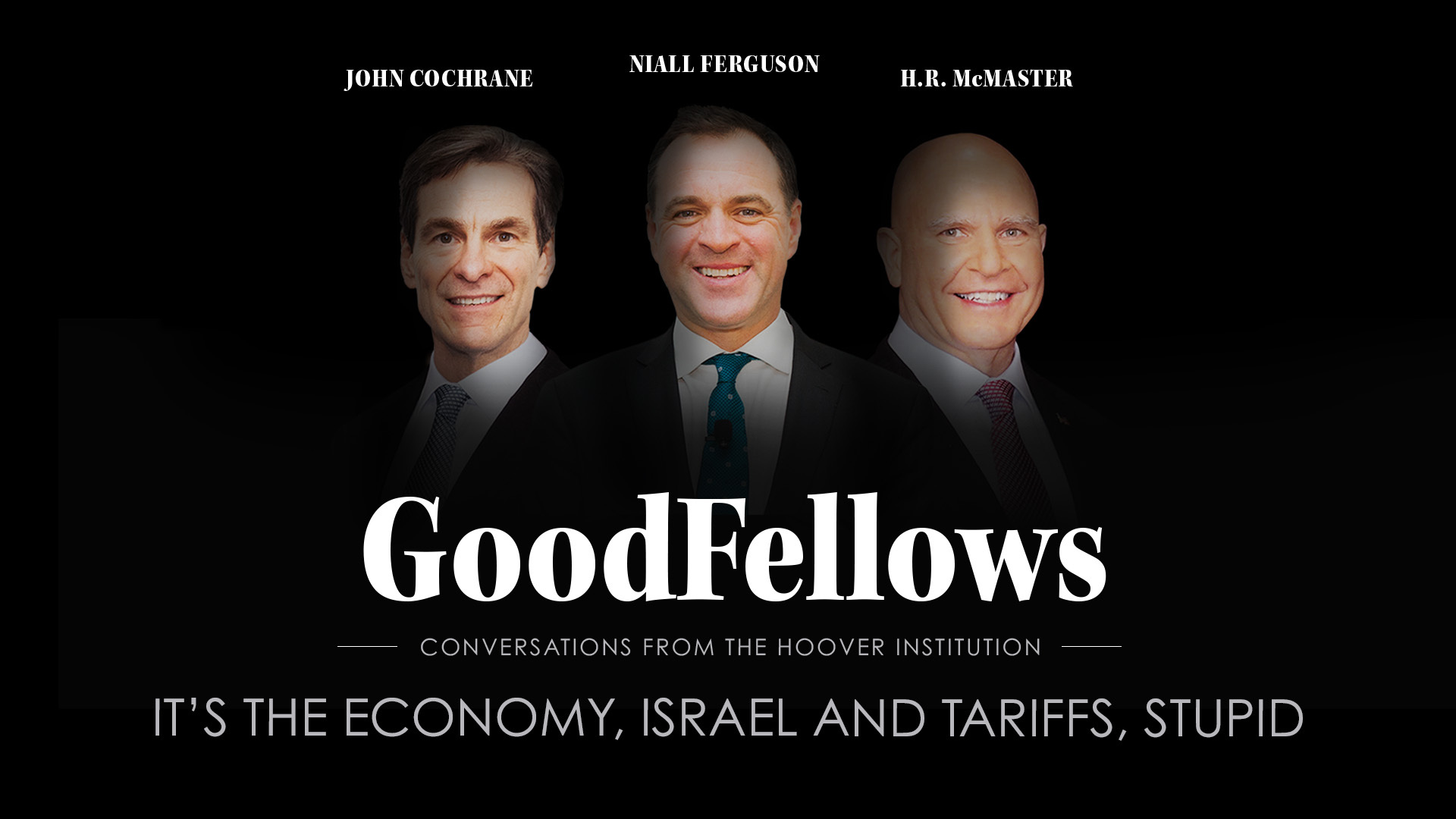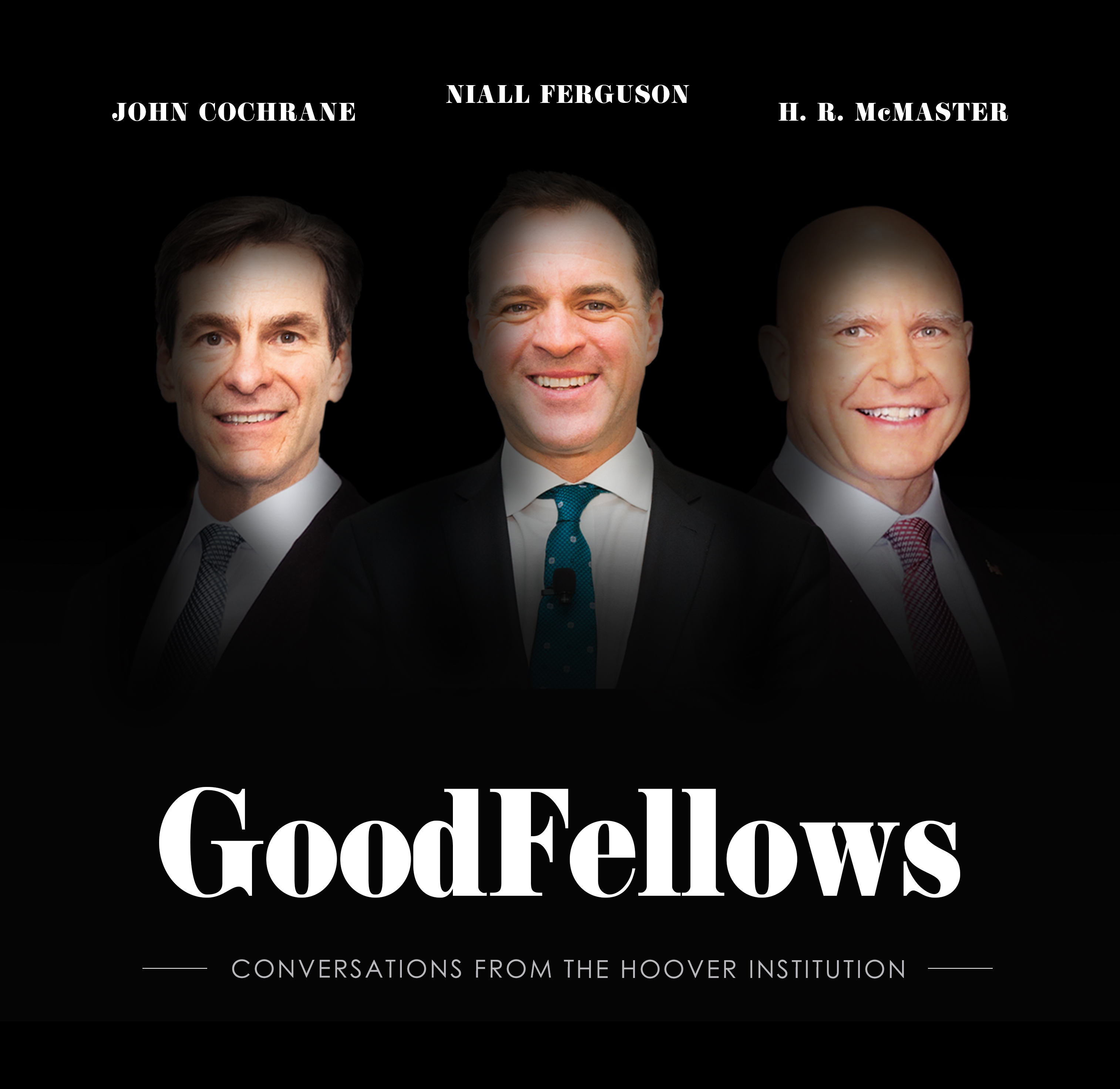- Middle East
- Key Countries / Regions
- Economics
- Monetary Policy
- Political Philosophy
- History
- Answering Challenges to Advanced Economies
- Determining America's Role in the World
- Revitalizing History
A hostage return and the signing of a cease-fire agreement signal a new chapter in the long-running dream of peace in the Middle East. Did it matter that the key negotiators, on the US side, were financiers and real-estate developers rather than scions of America’s diplomatic corps?
Russell Berman, a Hoover Institution senior fellow and codirector of Hoover’s Working Group on the Middle East and the Islamic World, joins GoodFellows regulars Niall Ferguson and John Cochrane to discuss the sturdiness of the Trump White House’s 20-point peace plan, the futures of Hamas and the Abraham Accords, the likelihood of Israeli Prime Minister Benjamin Netanyahu’s reliving Winston Churchill’s fate (a successful wartime leader rejected by a war-weary electorate), plus whether the “real estate-ism” approach to diplomacy is applicable to President Trump’s upcoming meetings with his Russian and Chinese counterparts.
After that, Niall and John reflect on the likelihood of a market crash (it is October, after all), the chances of a full-fledged tariff war with China, the merits of a US-Argentina currency swap, plus an ominous warning from the International Monetary Fund regarding global debt. Finally, the fellows salute the legendary economist Thomas Sowell, the subject of a Hoover Institution tribute later this month.
Recorded on October 17, 2025.
- It is Friday, October 17th, 2025. And welcome back to GoodFellows, a Hoover Institution broadcast, examining history, economics, and geopolitics. I'm Bill Whalen. I'm the moderator today, and I have a very envious job because I get to sit back and gain from the collective wisdom of a couple of my colleagues we jokingly refer to as the good fellows that would include the historian Sir Niall Ferguson. Hello Niall and the economist, John Cochrane. Normally we have a third good fellow that's Lieutenant General H.R. McMaster. But the good general cannot join us today. We will somehow soldier on in his absence. So gentlemen, two topics to get into today. I wanna talk economics with you guys. October is a month. A lot of people identify with economic hardship and bad news, stock market crashes, bank runs and whatnot. So Niall and John, I want the two of you to bat around some economic issues. But before that, let's talk about the big topic this week. And that is the prospect of peace in the Middle East. Joining us for this conversation is Russell Berman. Russell Berman is the Walter, a Haas professor at humanities here at Stanford University. He is a Hoover Institution senior fellow, as are Niall and John Russell. Also co-chairs Hoover's working group on the Middle East and the Islamic world. Russell, welcome to Goodfellows.
- Thanks for having me.
- So let's talk about the peace in Middle East. Now, we could do an entire hour just on the history of peace deals, why some work and others don't. Today, in fact, is the 31st anniversary of Israel and Jordan initializing a, a peace deal. We're also closing in on 25 years since Bill Clinton tried to broker a deal between Israel and the PLO and the closing days of his presidency. Russell, I assume that you and John and Niall, I assume you also looked at the 20 point plan put forward by the White House. Formerly it is called the Trump Declaration for Enduring Peace and Prosperity. And Russell, let's focus on that word enduring. You've looked at the plan, and my question to you, is it a plan that's designed to succeed or is it destined to fail?
- Bill, thanks for having me for this discussion. The plan is, is complex and a lot of details remain to be be worked out. I don't wanna throw cold water on it, and it has succeeded in bringing out the live hostages. Very important first step, but it expects a lot that has already been been reneged on by Hamas. It expects a disarmament of Hamas. It expects the return of the bodies of the deceased hostages. It is fair to say that not all those bodies will be easily found in the rubble of, of Gaza, but Hamas has clearly been dragging its feet. In addition, Hamas has been carrying out summary executions of members of competing factions in, in, in Gaza, and has said that it won't disarm and intends to participate in governance. So Hamas is already undermining the assumptions of the plan. In addition, there are very important next steps built in the plan that seem not to have been anything like developed the international stabilization force that is an alternative military to come in and take control, presumably to be made up of soldiers from various Muslim majority countries, Arab countries, sometimes Indonesia is listed as well. I don't think this has been worked through. In addition, the notion of a technocratic government, a nonpolitical dis government of Palestinians. Nice idea, but I'm looking for the dotted i's and the cross Ts, and they're not there,
- John.
- Well, as the economist, I always looked at people's interest. I, I, of course was very glad to see it happen, and I think we'll talk a little bit. Niall has a wonderful article on why it happened, how the, in particular, you know, in one week we went from everybody's jumping over themselves to recognize the new state of Palestine to this deal. The Arab countries turned around. So, so that's an interesting part. But yes, let's look forward. And here I, you know, looking at, at interest, I have to be a little pessimistic. Hamas needs to be defeated, and you can't, you know, we could put in a technocratic force, I don't know to run Denmark, but this is a, a place with one armed militia, very sadly, going out immediately to start the Civil War and, and to kill as many as they can of the other sources of power that people are kind of hoping might rise and provide a civil society. So, you know, you can't put in a international force un peacekeepers when there's no peace. Someone has to defeat them. And so my my worry is that it's in everyone's interest to just let this place rot. Israel doesn't mind if Gaza rots so long as, you know, rockets and terrorists don't come. And, and you know, rightly so, no, nobody in Gaza wants them running it. The Arab countries, do they wanna actually use the kind of force it's going to take to defeat Hamas and, and put some order in, in a, in an anarchic ganley? No, they don't want to do it. So it's to everyone's interest to let it rot. So much for Mara Gaza and, and you know, the, the lives prosperity and peace for the Palestinians can, can, you can, can you get me out of this kind of discouraging view?
- Well, Niall, Niall, do you wanna play the role of H.R. and be our optimist?
- Happy, happy to, I think, I think gentlemen, you're both being a bit too negative and, and maybe because you are approaching this as academics, you are, you are reading the 20 point plan and, and wanting footnotes. But of course the architects of this plan are not academics. They're real estate guys. They're the deal guys as Jared Kushner, Coles himself, and Steve Whitcoff. And the key here is to look behind the 20 point plan, which I think they concocted from work that Tony Blair and his people did in the summer. And ask yourself, have the constellations of force changed in a way that is significant? And I think they have, first of all, I think this plan extricate Prime Minister Benjamin Netanyahu from a real cul-de-sac that he got into, he was increasingly so isolated that Israel began to remind me of apartheids South Africa in terms of its international situation. And his military option had boiled down to occupy the whole of Gaza, something that has been tried before without success. So one thing that happened that made this deal possible was that he overreached the strike against Hamas leadership in Doha so infuriated the Gulf Arabs, that it gave Witkoff and Kushner away to put pressure on bb. And I think it's important to recognize that President Trump's able to do that in a way that I'm afraid President Biden just wasn't. More importantly, they were able to get the Qatari in particular, to lean on Hamas to sign the agreement and getting the hostages out is a major breakthrough. It's not a trivial thing, it's really the whole point because now that the hostages are out, then there's a very stark choice. Hamas can either cooperate with the terms of this agreement or face destruction and what have they got now they don't have any hostages, though they may have the corpses of the hostages they murdered. So I think it does change the situation quite profoundly. And I'll say one last thing. When Jared Kushner first became involved in the Middle East as a, as a problem of the first Trump administration, I remember discussing it with him and his plan was essentially to make the Palestinians less important than the economic revival of the region, taking advantage of the economic interests that United Israelis and Gulf Arabs, the Gulf Arabs need to diversify away from hydrocarbons. The Israelis have technology as well as democracy going for them. And that insight, when it was first proposed, was scorned by all the experts in the Middle East. I remember the sneering articles in the New York Times. I was one of the few people who said, you know what, this actually sounds like not a bad idea. And I think we are seeing here the revival of that project that gets, it produced the Abraham Accords in the first Trump term, but gets the Gulf Arabs in particular, and the Israelis into some better relationship with one another and, and makes the Palestinians less central to the grand problem of peace in the Middle East. So I think this is a really major breakthrough, not just because it gets the hostages out and leaves Hamas in a very vulnerable position should they decide to Rena entirely on the deal. More importantly, I think it's about getting the Abraham Accords process back on track. And it is a huge success for the real estate guys. And I think we should just take our academic hats off to them.
- But if I can Niall, the, the real estate guys over the diplomats Yes. But you said Hamas faced de destruction, who is going to go in and destroy Hamas now rather than just let Hamas rot in in Gaza? Yes, agree. They entirely that the, that this this go economics first was a brilliant idea. They should have asked economists, we would've said the same thing. You know, the Afghans have their own government. Having your own state is not the precondition for peace and prosperity. Peace and prosperity comes first and then, you know, people tend to pacify. So that, that was brilliant. And what I fear is that the Gulf Arabs and the Israelis can now start, we can go back to get ourselves rich, but you know, let the gazen rot who's gonna go in and dis and and face may kamas face destruction.
- I think that's the likely outcome, John, that the, the, the Israelis and the Gulf Arabs are now basically on the same page as, as Niall's pointed out, and maybe, maybe Gaza doesn't have to be solved, maybe it can just rot. I mean, let's face it, for 50 years the Arab states really haven't wanted a Palestinian state, and they continue to not have a Palestinian state and Gaza's gonna be a, a place of rubble. One question will be whether the Egyptian will let the Gaza's immigrate. People have been leaving the whole Levant for, for decades from Syria, from Lebanon, why can't they leave from Gaza? And that's it. So we're not gonna solve Gaza, we're not gonna solve Palestine, but we are going to solve the economics first prospect for the region.
- Yes. So what happened in Great Britain on July 5th, 1945, and I think Niall knows the answer, professor Ferguson,
- I think you are, you are thinking of the election that followed the, the victory in in Europe and election that Winston Churchill of course lost and lost resoundingly to Clement at Lee's Labor Party.
- Right? I mentioned this because Israel does not have an election until a year from now, October 27th. But I put this to the panel, is Bibi Netanyahu in 2026 gonna be Winston Churchill in 1945?
- Well, I certainly think he's in a very weak position and, and this is a kind of Churchillian tragedy in the sense that he has in all kinds of ways improved the, the strategic situation of Israel in the course of his career. It was Netanyahu who had the idea that if you focused on Iran as the Bei, as the real enemy, it would make it easier to build bridges to the Arab states neighboring a non neighboring, it's Netanyahu, who has been the Bismarck of the Middle East using blood and iron rather than fine speeches to impose Israel's dominance in the military domain. And if you think of the successes that he's achieved in the last two years, think of the decimation of Hezbollah. To take just one example, think of the fact that Bashar Alad is no more gone. It, it's a, it's a remarkable record, but like Bismarck, he has incurred the Appium of Biem liberals who want to look down on him for his Machiavellian devious domestic politics. But I can assure you, you don't do this kind of thing least of all in Israel without some pretty Machiavellian domestic politics. So I think probably, probably this is nearing the end of Netanyahu's career. I hope it's not going to be an ignominious end. I think it would be a, a genuine tragedy if he ended up facing criminal charges and a sentence indeed for the kind of corruption allegations that have been made against him. He's achieved too much for that to be a just fate. But, you know, as you say, bill, it's not like he has to face the voters tomorrow. And there may be time between now and the election for people to reflect on, on, on what he has achieved. I think it's, it's actually a very significant achievement. And the strategic situation of Israel has, has been greatly improved, even if it's diplomatically looking quite isolated at the moment.
- I agree that the Bismarck metaphor is appropriate for what Netanyahu has achieved in reshaping the, the map of the Middle East and Israel's position in it. It's my understanding though, that at this point he's, his coalition is actually somewhat up in the polls in, in Israel. So it's not, it's not absolutely dire for him. He's not particularly popular in European capitals, but he's, he, he, he has a lot of support in Israel still. But as Niall said, it's, it's a, it's a year away and a lot can happen between now and then.
- I would add, as Niall keeps reminding me, it's always the economy stupid. So if, if the year, if as we seem to be forecasting, everybody forgets about points three through four through through 20 on the plan, and you know, Gaza just sits the way it is, but Israel and the Arab states start getting going again. Israel economy's doing great, you know, net Yahoo may be looking better. And your comment was also Bill's question I think was also directed at, at the US and Niall and did a wonderful uncommon knowledge that I watched last week pointing out that great foreign policy successes for US presidents don't often translate into success at the polls. So, you know, Trump has really scored some pretty amazing foreign policy successes. And yes, it turns out that if you know how to negotiate with the unions and the zoning board in New York, you're, you're pretty well placed to negotiate with the Arabs and Hamas better, better than the professors of the Kennedy School. But, you know, is that gonna translate into support at home for Trump any better than it did for Nixon and others? And, and George Bush one who had, you know, great foreign policy successes.
- Listen, what's gonna happen next will include requests from Riyadh, from the Saudis to get a kind of security guarantee that President Trump has given to Qatar. And because we're dealing with deal makers, president Trump's gonna ask for something in return, and this could include improved relations with, with Israel, and that is moving toward strengthening of the Abraham Accord logic. So this, this, the, the region could well move forward and, and Gaza remains Amis.
- Another way of thinking about it, Russell, is that this is a Gaza peace plan, not a Middle East peace plan as it's often, I think Misleadingly referred to, if you look at the wider wars that, that Israel has been waging, and some people say it's been fighting on seven fronts, most of those fronts are still very much active. The most important by far is Iran. Now Iran was really brought to its knees by Israeli air defenses, and then Israeli air offenses reinforced of course by President Trump's authorization of the strike on the Florida nuclear facility. But Iran is in the process of recovering it is selling more oil than ever to China. And there is the sign, I think the first signs of a recovery and, and of course a reconstruction of its devastated air defenses. I don't think that Israel can let Iran simply repair itself when it had Iran at its mercy just a few months ago. So I think one has to kind of step back and, and look at the whole region and see that there's unfinished business in Tehran. There's unfinished business with the Houthis. Hezbollah has been devastated, but it's not gone and it's perfectly capable of reconstituting itself in Lebanon. And then there's the question of what happens next in, in Syria? Is there a way of, of getting this new regime into the Abraham Accords kind of path? Which I, I think is the idea that that Witkoff and, and Kushner have been and de Trump have been toying with. So there's a lot still to, to think about in the Middle East. I think anybody who says peace in the Middle East is coming is, is wrong. We're almost certain to more conflict, especially between Israel and Iran. But I think the key thing was to stop Gaza being the focal point of all debates, particularly because of the effect it was having in isolating Israel diplomatically. And that's why it was so important to get something done in Gaza, get hostages out. And now I think Hamas is in a weak position. I just wanna go back to a question that John asked, you know, what happens if Hamas completely defies the terms of the agreement? It will then I think they're in a much weaker position. A they've suffered tremendous losses over the last two years. B they control quite a lot less of Gaza than they did before, because under the terms of the deal, in effect, Israel controls half, slightly more than half of Gaza. And, and Hamas is carrying out its reprisals, its terroristic actions. It only part of the territory that it used to control entirely. So I think if they float things that they've signed up to, they're not gonna get a lot of sympathy in Doha or anywhere else. And as President Trump said on social media, just in the last 24 hours, if AMAs doesn't stick to the deal, then they can be destroyed. So I don't rule that scenario out.
- Well, you're, you're certainly right and we should emphasize the Abraham Accords are as much about let's all get together and counter a run as they are about economics, which is a, a good sign of the Abraham Accords coming back. But I do, you know, it will be interesting to see how things go in the half of Gaza that Israel keeps running, and hopefully that will be at least a model of, of, of, of things running a little better. But, you know, terrorist organizations depend on foreign funding and Gaza has been, the Hamas has received all sorts of funding from foreign governments and the United Nations and all sorts of useful idiots. And I'm just, I'm cynical that they would not start pouring money in now, maybe not the Arab governments in in this time, but certainly, you know, wealthy people around that mu there's wealthy people who hate Israel, who will pour money in that Gaza will steal the United Nations and they'll come and pour money in and Gaza will steal it. So I I I wonder that Gaza will really be as cut off as you say, and who is actually gonna go in with force and do anything about it. I think that's a hard question
- In, in all the discussions about recognizing a Palestinian state that took place in Europe, everyone mouthed the notion that Hamas should be disarmed. The only force willing to try to disarm Hamas has been the IDF, the International Station Force. This would be the Egyptian army and the Jordanian army, you know, where is it? Right? It's the, it's the pope's battalions. So I, I think that President Trump's threat that Hamas might still be destroyed is one possible scenario. The other is, I think John, you mentioned Afghanistan, it could just become this isolated enclave where people live in misery. Everybody's in agreement that life there is terrible, but nobody is going to decide to go in and let it, let, let it rot. Now there will be some funding, I'm not sure if the IES will continue to fund. Maybe they're, they're high on the list of the likely of likely donors. And then I guess Unaid is coming in and UNA is really just support for, for Hamas, but it's not gonna be a pretty picture there in Gaza. And the Gazen are one way or another going to get out. They'll, they'll buy their way out individually as it has been happening all along. But maybe it just won't be solved.
- I don't know if you saw the Trump tweet the other day where he said to Hamas, if you think about re-engaging in violence, we will come in and we will wipe you out. And then he said, add a message or something like that. Now, ordinarily Hamas might look at that and laugh, but this is a president who unleashed bombers on Iran's nuclear facility. So Russell, how pivotal was that attack on Iran in terms of pushing forward this peace process?
- Of course, it, it knocked out the foundation of the axis of resistance. But as Niall's point, Niall pointed out, it, it's, it's not, it's not gone. It's trying to rebuild the Middle East is the gift that keeps on giving in, in Lebanon, in, in Syria, in in Yemen and, and and Iran. All of that suggests to me also that a, when elections come in Israel, it's not as if the alternative to Netanyahu is gonna be a peace candidate. The, the, the Israelis, the Israeli left has disappeared. The, the, the Israeli public is not in the mood to compromise. Now there may be anti Netanyahu animosity because they don't like the guy or the corruption charges, but American liberals, the New York Times shouldn't imagine there's going to be a a, a Eugene McCarthy, a Bernie Sanders running against Netanyahu. That's, that's, that's illusory.
- Let's go back to the Abraham Abraham Accords and the idea of the Middle East moving forward. Russell, I'm to your thoughts about how the Abraham Accord and John, this is gonna get into economics, how it's gonna transform the region in terms of, and Niall has referenced this in terms of, for example, moving off fossil fuels, but how can the accords both change the region economically? Is it also culturally, is there gonna be a cultural change in the Middle East?
- Maybe what is pushing the, the economic model, the Abraham Accord model inexorably forward is the, the young generation in Saudi that wants to have prosperity, that wants to have jobs. And the promise inherent in Hamm and Salman's project 2030, he wa he, there's there's a vision of a prosperous region that would stretch from the Gulf up through Israel. Gaza could have been a linchpin in this, maybe it's still will be, but nobody's going to invest there until Hamas is gone. Because as long as Hamas is there, there's gonna be fighting, maybe it'll have to work around Gaza, but integrating Israelis technology and innovative capacity with the, the capital of the Gulf is, is how to build a a a a prosperous region. There's, there's a kind of irony here that, that, that there's a prospect for, for that Middle East region. The Gulf through Israel may be the larger Levant, I don't mean North Africa, maybe that region could really flourish in the current current decades, while we're watching the former colonial powers really decline with zombie economies and, and incapacity for governance. Think of France, think of the uk.
- What's exciting to me about the, the vision that Jared Kushner had in the first Trump administration is that it's not just something that a bunch of development economists at the state Department or the World Bank came up with. It's an actionable business plan. And in the period of what you might think of as the interregnum, when Joe Biden was nominally president, what was Kushner doing? Well with Affinity partners, he was building an investment fund raising money from the Qatari and the Saudis and investing that money in things like Israeli defense companies. So although that gets criticized, not least in the New York Times, because having left government, you're supposed to just kick your heels minding nobody's business. In reality, I think what has happened is that Kushner's Fund has deepened his ties in the region and shown that the Abraham Accords are a business plan as well as a diplomatic solution to the problem.
- I would just add that the Abraham Accords, well, I like the idea of economics first. Were very heavy on state directed investment as, as is the, you know, the general plan by the Saudis and that that produces big projects. And sometimes they work and sometimes they don't. The Soviet Union was big on state directed investments as Steve Kotkin shows they, you know, know how to make an enormous steel mill out in the middle of nowhere somewhere, but not always a profitable one. So, you know, a, a plan more based on free markets, entrepreneurship initiative, ease of trade and so forth, I think would've had better long run economic prospects. These are still very highly regulated economies. Even even Israel is, you know, talk to anybody trying to run a business in Israel. It's, it's full of permits and regulations and all the usual stuff. So I would, I I I would've more faith in a plan that was more based on liberal market principles rather than here's our plan for a billion dollars that we are going to direct to some, you know, solar project in the middle of the desert here, whatever.
- I still think you're being too negative. I think the idea that you can get Saudis to invest in Israeli companies is really quite profound and it helps to be a historian here. Russell C if you agree with me, if you think back to the last surprise attack that was launched against Israel 50 years before October 7th, 2023, the Yom Kippur war, think of the world then, now, then the Israeli economy really was a highly regulated and deep, virtually socialist economy with huge problems. Moreover, Israel was very isolated. It was a coalition of Arab states that went to war in 1973 and Israel really only had the United States to turn to at that time. Moreover, that war escalated into a major economic shock that affected the whole world because of the oil embargo imposed by the Arab OPEC states. Now we're in a completely transformed world. Now
- You're right
- Where the Arab states are in fact recognizing Israel one by one through the Abraham Accords and then through private channels investing in Israel. And it's Iran alone, the Islamic Republic that organizes the terrorist attacks and directly attacks Israel. So when you compare Israel's situation over 50 years, you can see how much better it is. I remember asking when I was last in Jerusalem and last year, a veteran of the 1973 war is Israel's situation better today than it was then. And this was just shortly after October 7th when the mood in Israel was pretty bleak, but his response was unhesitating. He said, it's a vastly better situation than we are in today. And I think that's the key, that there really has been a significant improvement in Israel's position, both economically and militarily and strategically. And the, these are the achievements that sometimes get lost in the daily debates,
- I think. I think that historical shift is, is true. But yeah, John, you know, I agree with your, your your, your hesitation about this state run economy plans in theory, but yeah, I I wonder what you're measuring it against. It's not as if the west is a, is a, is a beacon of Oh
- Yeah.
- Free market either. So this is about maybe as good as it gets in the world today. No, no. Policy is the, is the, is the metric.
- I, you know, my, my job as a free market economist is always to hold out hope that, you know, things could be better, but this is fantastically good. Israel is, is much more liberalized than it was back when it was truly socialist. It is a tech startup hub, a a defense, you know, innovative place. It could be better, you know, maybe we'll have Russ Roberts on a next time when it is in Shabbat. And you know, he, he can complain a little bit about Israel, but, but it is wonderfully better than it was. I think, you know, let's get back to the Palestinians who I would love to, you know, see have a prosperous, peaceful life at some point, you know, a lot of the redevelopment plans for the West Bank, which there, there might be a place that, you know, people could live a prosperous life even that involves lots of, you know, state money going into various development projects, which is, I I think, you know, a lot of it that gets wasted, but absolutely better than the alternative. No, no question. I just, I always hold out hope for better still.
- And a shout out here for another guest that we've had on in this, on this show in the past, Dan Sinner whose book Startup Nation was one of those books that I think forced everybody to, to reassess Israel. One of the things that's most interesting to me about the IDF, the Israel Defense forces that we were talking about earlier is not just that they are phenomenally good at very difficult kinds of warfare. And I don't think nearly enough recognition has been given to the extraordinarily difficult task that they have faced in Gaza over the last two years. But they're also highly innovative military and there have been many spinoffs commercial companies that have come out of people who serve in the IDF understood some of the challenges and and saw technological solutions to them. So I, I think this is another reason to be an optimist for all of its challenges. Israel remains a very innovative society. And maybe that's because it constantly has to fight for its survival. But I, I'm, I'm an optimist that there'll continue to be a place that generates innovation and attracts capital. And if that capital starts to flow from the gulf, because the Gulf states realize that they can't base their futures future on extracting hydrocarbons, then that seems to be the economic underpinning of this Abraham Accord process that, that Jared Kushner originally envisioned. Now I mention him one more time because I think he has not received anything like the recognition he deserves. On the contrary, I think he's been the recipient of some of the nastiest press that I can think of being directed against an a public individual in the last 10 years. But if you read his book, which is really very good, it gives an accountant of where the Abraham War Accords came from as a project and all the different people who played a part in making it happen. And, and it's this capacity to get particularly people in Saudi Arabia in the Emirates now more recently in Qatar, to realize there is a path forward. That the path to peace lies through economic interaction with Israel. That is the real genius here. And I do think it represents a paradigm shift. We, we used to think that solutions in the Middle East would come from diplomats or academics coming up with elaborate plans and then development funds being brought in to think about this as something that the private sector can drive, I think is really, really new. And despite all the criticisms that are directed routinely at President Trump, he's been able to achieve what eluded Joe Biden and I think would've entirely elude Kamala Harris if she'd become president.
- Well, wait, I object, we who always thought that the un and diplomats and, and World Bank development funds was the secret of success. 'cause we have been saying this is a terrible idea for years. And then is, you know, if what we're talking about is, is Saudi private funds going into fund vehicles that invest in, in Israeli startups? Yeah, I think the danger is, you know, 50 mile long, one mile high apartment buildings through the desert. That's the kind of investment that state run, state run investments lead to. And, and that can, that's just a waste of money.
- Okay, quick exit question gentlemen, then Professor Berman is going to leave us. Niall wrote a great column in the free press that I recommend all of you check out. And he has a phrase for the Trump approach to diplomacy. It's called real estate is. So my question to the three of you is, real estate is transferable. In other words, can Pete's about to meet with Vladimir Putin? Will real estate is work in terms of dealing with Putin and he's gonna meet at some point, I assume Xi Jinping during his presidency, will it apply to China?
- We were just talking about this, this shift from a, a model driven by diplomats and international organizations to one driven by the private sector. And the question, I think for the, this, this coming period, it will be whether that paradigm shift in the Middle East has international implications. Is the world going to be doing business by doing business differently going forward? So real estate is, I suppose is one, maybe one, one name for this or, or one, one version of it. And I think there are two aspects. One is understanding that territory really matters. It's, it's not a matter of of principles, it's not a matter of ideals, it's not a matter of of of democracy. It's about who co controls what ground. That's why there's a fight over Ukraine. That's why there may be a fight over Taiwan. And I would put the Greenland question on that list. The, the, the, the second aspect is what sort of professional is going to be operating in the negotiations of the future? Will it be the ac will it be the Kennedy School or will it be the business school? Will it be, will it be conceptual idealists or will it be hard-nosed businessmen? And I think we're moving this, this is why President Trump, you know, may not be an outlier, but a harbinger of a different sort of personality. Someone who brings real world business, world real estate or otherwise savvy to the, to international affairs.
- Well, I, I really enjoyed Niall's piece on real estate is, and I think the, the danger of it is you need to not just have the ability to make a deal, you need a goal. So where are we going? And sometimes a lot of this stuff seems to be we're, we're have tactics, but we're not clear on, on where we going. We'll pursue that over consistently, over a long period of time. Is that desire was, was stated by the diplomats and the tactics of real estate is I think could be useful, but only if that is there. Second real estate is, as Niall pointed out, there's bottom line is a positive sum game where, where there's a lot of, how much do I make, how much you make. But at the end, we gotta get this building built and we, we all profit from it. And, and sometimes in international affairs that that's not true. And, and finally, Greenland, I'm glad you brought up Greenland and just a place where real estate is and would really help in international affairs is if we would just buy stuff. So, you know, Trump's brought out the military very quickly and, and I think he meant that as kind of a threat, but it would make abundant sense for the US to buy Greenland. And we got the money and, and the tiny amount of people, we could make them all insanely rich. We should buy things more often. If Putin had told Ukraine in 2010, I'd like to buy Crimea from you, he probably could have gotten it much cheaper than he is getting it right now. And a lot of people wouldn't be dead.
- Well, real estate, real estate is the highest form of realism. And this was really the, the pun that I intended thus far. It hasn't worked with Putin. Remember at Anchorage the summit failed because the deal that Trump and Whitcoff put before Putin, you get some more square miles of Don Bass and you get to keep Crimea, but you have to let Ukraine continue to exist as an independent state. Wasn't of any interest to Putin. And, and Trump is still a little sore about that. The negotiations are ongoing as we speak, we'll see where they go. But until the costs of continuing the war rise significantly for Putin above where they are now, I don't think that there's gonna be a success for real estate is with respect to Ukraine. As for Taiwan, that is gonna be the most interesting of all these diplomatic transactions because President Trump clearly wants to have a meeting and then a summit with Cxi Jinping. And he clearly has some notion of a big beautiful deal in mind. But the Chinese are gonna play hardball because this deal is going to be based partly on the leverage that they have through their monopoly or near monopoly on rare earths. And because of their ultimate demand that Taiwan ceased to be defacto an autonomous entity and come under the control of Beijing in the way that Hong Kong has. So this is the big one and it's gonna be extremely interesting to see how real estate is works when it comes into contact with the Chinese Communist Party, which has a very different approach to diplomacy.
- And you're also right Niall, it's not a one and done. We, we finally fought, we built the building. This is gonna be something that goes on for long past Trump's presidency. So it, it may not yield to the real estate is let's get one big deal, build the building and we're done approach.
- Well Russell Bernan, thanks for joining us today. I wanna add, by the way, Russell is in New York City, New York, perhaps soon to have negotiations with the Trump administration when its new mayor comes in, we'll see if real estate is works in New York City.
- Alright, thank you.
- Thank you Russell. Okay, onto our B block in economics. And John Cochrane, thank you very much for mentioning it's the Economy Stupid because that was the Clinton campaign's mantra in 1992. Did you know John that I worked on the Bush campaign? Did you know John, that it's the only November losing Bush campaign. If you go to a Bush reunion, you have a big L in your forehead because of that. So thank you for that trauma, John. But let's talk economics. Let me ask the obligatory layman question to you. Two very bright individuals, every time October comes around the media flood us with stories about is the crash coming? And sure enough, the journalist Andrew Ross Sorkin is making the rounds with the book in which he claims that 1929 is fast. So gentlemen, is the crash coming or are we getting a little hysterical talking about a crash? I turned to you, the grumpy economist.
- Okay, Niall is e even more qualified than I am? I the crash is coming when I don't know. I mean, you know, stocks go up, stocks go down. That's obvious. I don't think 1929 is coming. I think 2000 might be coming. These, these events go in a a pretty standard cycle. We have a fascinating new technology, a lot of excitement about it, a lot of trading on in information or opinions about who's up, who's down price. Earnings ratios go way high. We build a lot of data centers scratching our heads now at just where is the earnings gonna come to justify all this investment. Sooner or later those stocks come back to earth, especially once the initial froth dies down or, or some piece of news comes out. Is it terrible? No, that, you know, we then we will have all these data centers as we've built a lot of fiber optic cable, we got the fiber optic cable stocks falling by themselves is usually not that bad for the economy as 2000 was not 2008. When stocks go down, you go home, you have, you have a whiskey, you, you, you know, scream at the dog, there's not much you can do about it. So it's not really a, a big problem until banks and credit and, and debt gets involved and then, then the credit process dries up in the economy falls down. So I think there's a good chance that sooner or later that there's an easy forecast to make. Sooner or later those very high valuations will come down. People will lose some money. AI will keep going. The economy might slow down a little bit, but I don't, I don't see a 1929 coming, but maybe Niall does.
- Well I haven't yet read Andrew's book, but I did encourage him to write it because he did such a, an extraordinary job in too big to fail on the 2008, 2009 financial crisis that it just seemed a great idea to have somebody with his skills go back and tell the story of, of 1929 and it's actually a book that doesn't exist, or at least it didn't until this one came out. There are lots of books about the Great Depression, but they're strangely lacking in the kind of narrative detail that one ideally would like to have. So I'm really looking forward to reading this and I'm sure it'll be terrific. I agree with John the preconditions for something as cataclysmic as 19 20, 19 32 aren't there. Let's remember that it wasn't just that you had the roaring twenties and a stock market bubble. You then had a federal reserve that did almost everything wrong to magnify the shock allowing banks to fail in such large numbers that you had a roughly 30% peak to trough decline in prices and unemployment soaring to very close to 30%. I mean, this was an economic disaster, unprecedented and un matched sins in American economic history. That's highly unlikely, I would say almost impossible to repeat itself, not least because economists and central bankers learn lessons from the mistakes. Think only of the fantastic lessons are are great Hoover fellow Milton Friedman learn from the depression. So I think we won't make those monetary mistakes again. On the other hand, when you turn to trade policy, you get a slightly different picture, shocking facts of the day. The American average tariff rate is estimated to be back today to where it was in 1934. I think if you told every single one of John's colleagues in economics a year ago that US tariffs were gonna go back to the, the levels of 19 or the rates of 1934, they'd all have predicted a recession if not a depression. And one of the odder things is that we've done that, president Trump has done that, that tariffs are coming in at these levels that 10 times what we saw prior to his entry to the political scene. And yet here we are, the markets are still close to record highs and the recession that people keep talking about shows absolutely no sign of materializing. So this is a fascinating time to be an economist. I'd thought, John, it's certainly a fascinating time to be an economic historian because all the things we used to say about free trade and tariffs, particularly about the role of tariffs in, in the depression looking a bit shaky because no bad stuff is happening for sort that would've been predicted a year ago. If you'd known what Trump was gonna do then
- I guess I think actually most economists were not jumping to tariffs recession, the,
- But they were John, the ones within the bell prizes all wrote a letter, you gotta remember this all in the Nobel Laureates wrote a letter saying that unless Kamala Harris was elected president, terrible things would happen because President Trump would do tariffs and he's done tariffs and there were whereby terrible things. I don't know, I
- I object to your all the Nobel prizes that all the no, none of the Nobel prizes from Chicago signed that letter because you know, the Nobel Prizes are central left democrats in, in full Trump derangement syndrome and anything Trump does, they would say that. So they, they annually embarrass themselves with joint letters on, on ridiculous things, right? Tariffs let, so tariffs are a supply shock, if you will. They are, you know, they're a sales tax on some kinds of goods. We have sales taxes on other kinds of goods. It doesn't kill the economy. What supply shocks do is they, they lower the economy's long run growth rate. So really the danger of tariffs is, is not that it will cause a recession. Recession seems to always need something financial to go wrong. Somebody to, to go bust and lose, lose a lot of money and then credit dries up. That's the sharp kind of decline of a recession. But tariffs are just like regulations and taxes, they're sand in the gears that, that slow down the growth rate and turn us a little more into something that looks like France rather than something that will, will dump the economy. Right now the uncertainty about tariffs was something that more economists said, oh wow, you know, people stop investing and it seems that investment's slowing down except tech investment is, is way off the roofs on supply. You know, there's headwinds and tailwinds. So, you know, one of the great things Trump did first day in office was we are not gonna commit energy suicide like Europe does. So there's a, a positive supply shock. So, you know, the supply end of it is kind of, there's, there's the good things, there's the tariffs, which are an an extra tax and, and I think they will, they will ha if they stay, they will have their effect in the longer run, we become a more protected economy, a less competitive economy, a less innovative economy. 'cause there's less pressure to do things. We we're doing, you know, we do things inefficiently, you don't buy stuff abroad, you, you do it at home. That's, that's more expensive. So that's, it's kind of a boil the frog effect rather than something that immediately causes the recession.
- And you two give me a couple good minutes on one tariff in particular and that is China. The a hundred percent tariff on China, this of course drives the market crazy. Trump dropped the bomb on this a week ago. The market lost $2 trillion in value. Niall, there's a very ominous headline in the free press that it reads, Niall Ferguson, will trade war become a real war?
- Hmm. Well of course the real issue here is not what President Trump threatened to do. It's what China threatened to do. Last week the Chinese government announced that it was going to create licenses, a licensing system for all rare earth exports to everywhere, not just to the us. And since China has a near monopoly on rare earth's mining and particularly refining, that was a pretty big gauntlet to throw down before Xi Jinping and Donald Trump meet in South Korea later this month. And that elicited a response from Trump, which was to threaten to go back to a hundred percent tariffs on Chinese imports. We've been there before, remember, and the last time we were there it was the Chinese who threatened to restrict rare earth exports and that led to something of a deescalation. So we're now into another round of a kind of economic war that dates back all the way to the first Trump term when he first started to impose tariffs as well as to impose restrictions on Chinese tech companies. I don't think it's gonna boil over into real war. Just to be clear, that would be the nightmare scenario. The war over Taiwan that we've often talked about on this show right now. I think they're both content to trade economic blows as they have been doing all year. And the hard thing to predict is who blinks. It's been Trump on at least two occasions this year so far because we went from full embargo and Chinese imports at the very height of his, his his tariff imposition to quite quick deescalation when the Chinese first played this ro rare Earths card. And they've just played it again only this time they've really slammed it down on the table. It's gonna be quite fascinating to see how this gets resolved if it gets resolved before the two leaders meet in South Korea. I suspect Treasury Secretary Bessant is working very hard on this as we speak.
- Yeah, and it, you know, you, the way we pose the question to start with is really not what tariffs are about these days. It's not about attacks on imports and, and and how much does stuff co cost. Tariffs are a a, a geopolitical weapon and one thing certainly it's become clearer to me is that they may not hurt the US that much, but they hurt the other countries a lot. I visited Switzerland and the first thing anybody wanted to ask me was, what about those 35% tariffs? What the hell do we do to deserve this? And I said, well, you know, I don't work for the administration so I can help you on it. So these are being used as a, as a, in a trade war, in a, in a, in a, a geopolitical strategy. And, you know, how's that working out? Not well I would say, I mean one of the most important things is what is the goal? And, and you know, we're kind of playing tactics. What do we want the Chinese to do? When, when do we say, okay enough you've done it and doesn't seem clear. Now the rare earths is interesting because, you know, we slap export controls on China and, and everyone Oh yeah, we don't wanna send them chips that they might use in their fighter aircraft. And China turned out and said, well you use rare earths in your fighter aircraft so we don't wanna send you rare earths you'd use in your fighter aircraft. So that's kind of as a, a deep puzzle there. It's in, in some sense a hard to object on the security end. I mean, what, you know, why don't we make wars? Well 'cause impossible to get the permits in the US but I do think this leads to a danger of of too much reshoring, you know, to have enough rare earth around to, to build F 30 fives in a war, you just need a big stockpile of rare earths. You don't need that. Every, every bicycle's electric motor gets made by rare earths made in the US from using labor in the US and and so forth. So that's, that's a danger of a permanent state, state of, you know, wrapping everything in the flag. So the negotiation comes and, and I wish they were clear about where they wanted to go. 'cause we, we gotta climb off this a hundred percent tariffs from China and, and, and no rare earth to the US it's gonna take us 20 to build rare earth mines even if we wanna do it. And by the way, we need allies. The answer to the rare earth problems is, you know, Australia's got 'em and, and Brazil's got 'em and, and you know, we can refine them in other places in the world. Well everybody else around the world is kind of pissed off with us right now. So it, it would be nice to be clearer about tariffs on our allies if we want people to join us and try to create something outside China.
- Okay, one final economic question. We're gonna go to lightning round. Speaking up a hundred percent. The International Monetary fund, or IMF came out with a rather dire warning this week. It claims that government debt worldwide is on a course to hit a hundred percent of GDP. By 2029 US is projected to surpass 140%. China's gonna reach about 113% Elan. John does any country have a plan to avoid this?
- Well, a couple spring to mind The Germans of course imposed a kind of hair shirt on themselves by having a debt break. They've lifted that debt break so they can re-arm and do something to deter Russia. So the Germans are in a much better fiscal position than anybody else. Of course they might not stay that way if they spend, if they run deficits for the next 10 or 20 years. The other interesting case, which has become highly topical in the US news is Argentina, where President Javier MLA tried to eliminate a 5% of GDP deficit in a year. We talked about this shortly after I visited Buenos Aires back in July when it all was going very well. It's gone a lot less well in recent months, partly for political reasons. 'cause the usual suspects the parness to trying their best to destabilize as government and partly because of a kind of nasty technical monetary policy problem. If you are running a central bank in an emerging market and your exchange rate starts to become a source of stress, you raise rates by raising rates, you weaken the economy. It's a familiar story. John's probably top many a class on this kind of, of, of a currency crisis. But there's an exception that proves the rule. The exception is when you've got Donald Trump on your side and President Malay has been in effect bailed out by the US Treasury in a way that I think has almost no precedent. I don't think the Mexicans ever got deals as good as this kind of unconditional credit line from the US Treasury. Will it simul through the coming midterm elections? Well, we've got only a few days to go and I think everybody in Buenos Aires is crossing their fingers and toes. But it's been an extraordinary sequence of events with I think very few presidents in the history of Latin American debt crises. Right John?
- The debt break, the Germans had this lovely debt break. Now you said they broke it in order to finance military and I would add finance military without cutting back on their social spending. 'cause military is still couch change. It's still a couple percent of GDP social spending is half A GDP. So they didn't want to even cut down a little bit. Switzerland has a debt break and it's working very well. You want a country that actually does so something about it, I I think that debt breaks are, are an excellent idea because they guarantee people if you borrow money you're going to repay it. And, and that really, that hamiltonian faith in your country's debt is, is very useful. Plans are easy. It, it's we, we all know how to solve this debt problem. The only question is when do our governments get around to doing the obvious things, tax reform, social program reform. But things grow a little bit. So there's bipartisan plans all over the place and I think I'm actually becoming more optimistic when interest rates go up. Governments will wake up and and do something about it or democracy and civil western civilization will fail. Take, take your choice. Argentina is lovely. Now Malay was very freemark about everything except for Puzzlingly, the dollarization, which was the thing he kind of wented in on. And that's really the, our answer to Argentina's woes and I added it up. All of Argentina's money is $40 billion. So best's only 20 billion short. You, you can exchange all of Argentina's pesos for $40 billion of US dollars. And that's, and the level of bailouts actually that's small compared to the Latin American bailouts and bank bailouts. We've done it. We usually, a country's a billion dollars. So yeah, I would just say dollarized the thing tomorrow, you know, it's only gonna cost another 20 billion now then all the debt is dollar denominated debt. And we're back to how does Argentina pay back dollar denominated debt? But they swung to surplus very quickly and, and I think, you know, then, then you're back to just a regular debt crisis. Not regular devaluation, but Argentina would do very well if they just dollarized and gave up on the whole business.
- Okay John, I think we owe you another economic round future show. We didn't get into the fed, we didn't get into the AI bubble, which fascinates me, which gets best back to the 1920s scenario. But gentlemen, it's on to the lightning round. Martin, very simple. One question. What are you reading these days, Niall?
- Well, I have been reading the works of one of our fellow fellows, namely Thomas Sowell, prolific author. I found I'd read only a small fraction of his work and ahead of the conference that we were about to hold to celebrate his extraordinary achievements. And 95th birthday I read his remarkable trilogy, race and Culture, migrations and Cultures, conquests and Cultures. And I was blown away by the early edition, the scope, the radicalism of the argument. Just fantastic stuff. Can't recommend those books too highly.
- I can't recommend 'em too highly as well. 'cause they were, I I read, read his stuff on race starting in the 1980s and it was just eyeopening, eyeopening in particular, how he just brings factual detail to, to bear. You know, he traces how small ethnic groups that white people can't tell apart and how differently they do in the us. That's, you know, the kind of factual detail that that, that most people don't, don't do. And it just makes the argument utterly persuasive. I have been reading Knowledge and Decisions, a single book, but his economic masterpiece. 'cause my assignment for next week was to summarize this one economic masterpiece, which it is really bears reading. It's, it's just another treasure trove of detail about how not just, it's not really about economics, it's about how organizations and politics and non-economic structures work and don't work to, to, to funnel the information around that they all need to, to, to get anywhere. So fascinating read and we'll get to discuss it on Tuesday.
- Right. So, Niall, I've been reading history in particular, I've been reading the works of Theodore White in his making of the president series beginning in 1960 because politics is very different in 19 60, 64, 68 in particular. But also, this is just a very straightforward accounting of campaigns. There is no effort to go out and get Niall Ferguson to dime on John Cochran or so forth in political books these days. That's how you sell books. You put Todd things and just how it moves. Copy. This is just Plaino reporting. It's delightful to read.
- I agree. I know those books well. I, I read two of them when I was writing the first volume of the Kissinger biography and you're right. They're, they're terrific.
- Alright, gentlemen. With that we will conclude this episode of Goodfellows. We will be back in late October slash early May. Michael McFall Hoover fellow former Ambassador Russia will be our guest. Also, a reminder that on November we are doing a mailbag show. So if you have a question for Ser Niall, a question for John, a question for HR, or a question for some combination of those three, please send them in and you go to the hoover institutions website, hoover.org/ask goodfellows to pose your question. Once again, hoover.org/ask Goodfellows On behalf of the Goodfellows Ser Niall Ferguson, John Cochran, the truant HR McMaster, hope you enjoyed today's show. As always, thanks for watching. We'll see you soon. Till then, take care
- Seems like you to walk with. Seems like.



















